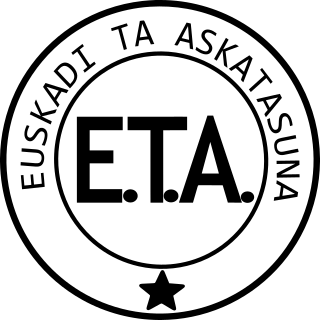
ETA, an acronym for Euskadi Ta Askatasuna, was an armed Basque nationalist and far-left separatist organization in the Basque Country between 1959 and 2018, with its goal being independence for the region. The group was founded in 1959 during the era of Francoist Spain, and later evolved from a pacifist group promoting traditional Basque culture to a violent paramilitary group. It engaged in a campaign of bombings, assassinations, and kidnappings throughout Spain and especially the Southern Basque Country against the regime, which was highly centralised and hostile to the expression of non-Castilian minority identities. ETA was the main group within the Basque National Liberation Movement and was the most important Basque participant in the Basque conflict.
Batasuna was a Basque nationalist political party. Based mainly in Spain, it was banned in 2003, after a court ruling declared proven that the party was financing ETA with public money.

Baltasar Garzón Real is a Spanish former judge. He served on Spain's central criminal court, the Audiencia Nacional, and was the examining magistrate of the Juzgado Central de Instrucción No. 5, which investigates the most important criminal cases in Spain, including terrorism, organised crime, and money laundering. In 2011, he was suspended from judicial activity and in 2012 he was convicted of illegal wiretapping and disbarred for a period of 11 years. During this time, Garzón legally assisted Julian Assange. In the landmark case Baltasar Garzón v. Spain (2021), the United Nations Human Rights Committee found that Garzón's trial in Spain was "arbitrary" and violated the International Covenant on Civil and Political Rights.
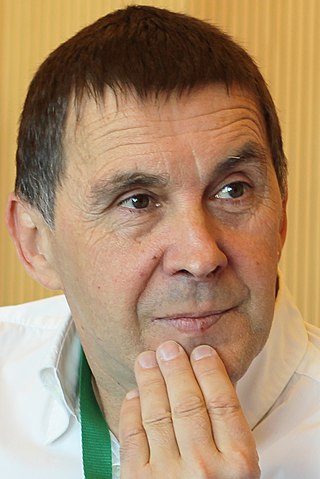
Arnaldo Otegi Mondragón is a politician from the Basque Country who has been the General Secretary of Basque nationalist party EH Bildu since 2017. He was member of the Basque Parliament for both Herri Batasuna and Euskal Herritarrok. He was a convicted member of the ETA, a banned armed separatist group organization, in his early years. He was one of the key negotiators during the unsuccessful peace talks in Loiola and Geneva, in 2006.
The Basque National Liberation Movement was an umbrella term that comprised all social, political and armed organizations orbiting around the ideas of the illegal armed organisation Euskadi Ta Askatasuna (ETA), proscribed internationally as a terrorist organisation.

Basque Nationalist Action is a Basque nationalist party based in Spain. Founded in 1930, it was the first Basque nationalist political party to exist running on a socialist program. On 16 September 2008, the party was outlawed by the Spanish Supreme Court based on ties with ETA. The Spanish ruling was appealed to the European Court of Human Rights, which, after reviewing the question, upheld the Spanish courts on the matter.
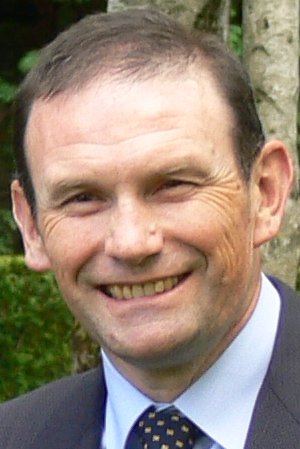
The 2005 Basque regional election was held on Sunday, 17 April 2005, to elect the 8th Parliament of the Basque Autonomous Community. All 75 seats in the Parliament were up for election.

Askatasuna is a Basque political party registered on 31 August 1998, and outlawed in 2009 by the Spanish Audiencia Nacional under the 2002 Political Parties Law.

Aralar was a Basque socialist and separatist political party in Spain. It was opposed to the violent struggle of ETA.

The 2009 Basque regional election was held on Sunday, 1 March 2009, to elect the 9th Parliament of the Basque Autonomous Community. All 75 seats in the Parliament were up for election. The election was held simultaneously with a regional election in Galicia. It would be the first time that the elections for two of the Spanish "historical regions"—namely, those comprising Andalusia, Catalonia, Galicia and the Basque Country itself—were held simultaneously. This would evolve into an unwritten convention in subsequent years, with Basque and Galician elections being held concurrently in 2012, 2016 and 2020.
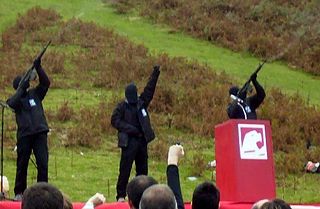
The Basque conflict, also known as The terrorist fight in the Basque Country or as Spain–ETA conflict, was an armed and political conflict fought from 1959 to 2011 by the Basque National Liberation Movement, a group of Basque nationalist organizations which sought independence for the Basque Country, against Spain and France through various social, political, and terrorist means. The movement was largely built around Euskadi Ta Askatasuna (ETA), a terrorist organization, which had launched a campaign of attacks against Spanish administrations and civilians since 1959. ETA had been proscribed as a terrorist organization by the Spanish, British, French and American authorities at different moments. The conflict took place mostly on Spanish soil, although to a smaller degree it was also present in France, which was primarily used as a safe haven by ETA members. It was the longest running violent conflict in modern Western Europe. It has been sometimes referred to as "Europe's longest war".

The 2012 Basque regional election was held on Sunday, 21 October 2012, to elect the 10th Parliament of the Basque Autonomous Community. All 75 seats in the Parliament were up for election. The election was held simultaneously with a regional election in Galicia. Lehendakari Patxi López announced the parliament's dissolution half a year ahead of schedule as a result of the People's Party (PP) withdrawing their support from his government, prompting Galician president Alberto Núñez Feijóo, who had been scheduling a snap election in Galicia to be held at some point throughout late 2012, to make his decision to have a simultaneous vote.
EH Bildu, short for Euskal Herria Bildu, is a left-wing, Basque nationalist and pro-independence political party and a federation of political parties in Spain. It is the main political force of the abertzale left in Spain. EH Bildu is active in the Southern Basque Country, that is, in the Basque Autonomous Community and Chartered Community of Navarre, as well as in the Treviño enclave of the Burgos Province. In the Northern Basque Country, it has an alliance with the party Euskal Herria Bai, with the goal of establishing a state for the Basque Country across the Spanish-French border.

Abertzale left is a term used to refer to the parties or organizations of the Basque nationalist/separatist left, stretching from democratic socialism to communism.

The 2016 Basque regional election was held on Sunday, 25 September 2016, to elect the 11th Parliament of the Basque Autonomous Community. All 75 seats in the Parliament were up for election. The election was held simultaneously with a regional election in Galicia. Lehendakari Iñigo Urkullu announced that the election would be held one month ahead of schedule, on 25 September 2016, based on the "climate of ungovernability" affecting national politics as a result of the ongoing Spanish government formation negotiations, intending to move the regional election as far away as possible from a possible new general election. This prompted Galician president Alberto Núñez Feijóo to hold the Galician regional election in the same date.
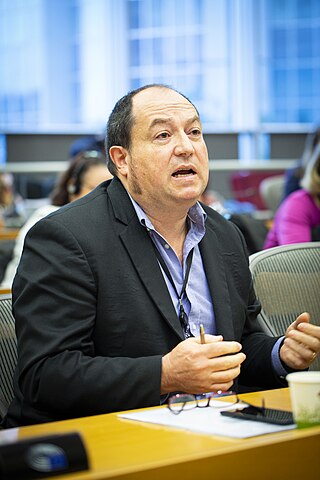
Joxe Pernando Barrena Arza is a Basque politician, former member of the Parliament of Navarre and member of the European Parliament for Spain.

Maria Angeles Beitialarrangoitia Lizarralde is a Basque journalist and politician. She was previously a member of the Congress of Deputies of Spain and Basque Parliament, and mayor of Hernani.

The 2024 Basque regional election was held on Sunday, 21 April 2024, to elect the 13th Parliament of the Basque Autonomous Community. All 75 seats in the Parliament were up for election.
Maite Aranburu Olabarrieta is a Spanish Basque politician who served in the Basque Parliament from 2005 until 2009, representing the Biscay constituency as a member of the Communist Party of the Basque Homelands.
















